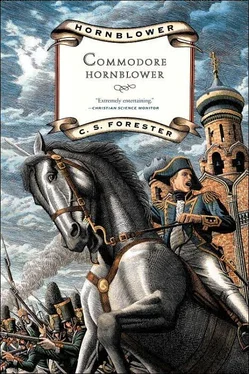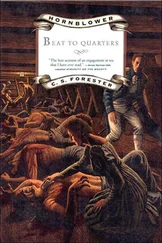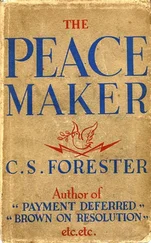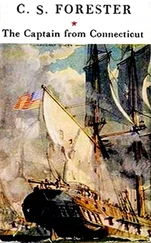“The two captains of the bomb-vessels are irreplaceable; there are no other lieutenants with us who can use their infernal machines as well as they can. I don’t have to explain to you why Captain Bush is irreplaceable. It was Mr. Vickery who happened to go with me to investigate the boom, and so he happens to know more about the situation than Mr. Cole, who’s the other obvious candidate for the command.”
There was no harm in soothing Cole’s feelings with an excuse like that, for no good end would be served by letting people guess that he would not trust Cole with any command out of his sight—poor old Cole, grey-haired and bowed, almost too old for his work, hoping against hope for promotion to captain. Hornblower had an uneasy feeling that Cole saw through the excuse, and had to comfort himself with the trite thought that no war can be fought without someone’s feelings being hurt. He passed on hurriedly to the next point.
“Having settled that question, gentlemen, I would welcome your views on who else should go as Mr. Vickery’s subordinates. Mr. Vickery first, as he is most concerned.”
When those details were settled the next step was to prepare the four boats for the expedition— Nonsuch ’s launch and cutter, and the cutters from Lotus and Raven. A four-pounder in the eyes of the launch, a three-pounder in the eyes of each of the cutters; food, water, ammunition, combustibles for setting captures on fire. The crews that had been told off for the expedition were paraded and inspected, the seamen with pistols and cutlasses, the marines with muskets and bayonets. At the end of the day Vickery came back on board Nonsuch for a final confirmation of the future rendezvous.
“Good luck,” said Hornblower.
“Thank you, sir,” said Vickery.
He looked frankly into Hornblower’s eyes.
“I have so much to thank you for, sir,” he added.
“Don’t thank me, thank yourself,” said Hornblower testily.
He found it particularly irksome to be thanked for risking young Vickery’s life. He calculated to himself that if he had married as a midshipman he might by now be the father of a son just Vickery’s age.
At nightfall the squadron stood in towards the land. The wind was backing northerly a little, but it was still blowing a strong breeze, and although the night was not quite as overcast as the preceding one, there was every chance that the boats would slip through unobserved. Hornblower watched them go, just as two bells struck in the middle watch, and as they vanished into the greyness he turned away. Now he would have to wait. It interested him to discover once more that he would genuinely and sincerely have preferred to be in action himself, that he would rather be risking life and limb and liberty there in the Frisches Haff than be here safe at sea with nothing to do but await results. He looked on himself as a coward; he dreaded mutilation and he disliked the thought of death only less than that, so that it was a matter of peculiar interest to find that there were some things he disliked even more than danger. When a long enough time had elapsed for the boats to have passed the boom—or for them to have fallen into the hands of the enemy—Hornblower went below to rest for the brief interval before dawn, but he could only pretend to sleep, he could only hold himself down in his cot and prevent himself by sheer mental effort from tossing and turning. It was a positive relief to go out on the half-deck again when the sky began to grow lighter, to souse himself under the head-pump, and then to go up on the quarter-deck and drink coffee there, glancing the while over the starboard quarter where (with the ship hove-to on the port tack) lay Pillau and the entrance to the Haff.
The growing daylight revealed it all through Hornblower’s glass. At random cannon-shot lay the yellow and green headland on which Pillau was set; the twin church steeples were clearly visible. The line of the boom showed up, lying across the entrance, marked by breaking waves and occasionally a glimpse of dark timber. Those dark mounds above the water’s edge must be the batteries thrown up there to defend the entrance. On the other side lay the long line of the Nehrung, a yellowish green line of sandhills, rising and falling with minute variations of altitude as far as the eye could see, and beyond. But through the entrance there was nothing to see at all, nothing except grey water, flecked here and there with white where the shoals dotted the lagoon. The opposite shore of the Haff was too distant to be visible from the deck.
“Captain Bush,” ordered Hornblower, “would you please be good enough to send an officer with good eyes to the masthead with a glass?”
“Aye aye, sir.”
Hornblower watched the young lieutenant dashing up the rigging, moving as fast as he could with his Commodore’s eye on him, hanging back downward as he scaled the futtock-shrouds, going hand over hand up the topgallant-shrouds, Hornblower knew that in his present condition he could not do that without resting in the maintop for a space, and he also knew that his eyes were not as good as they were—not as good as the lieutenant’s. He watched the lieutenant settle himself at the topgallant mast-head, adjust his glass, and sweep the horizon, and he waited impatiently for a report. Unable to wait longer he grabbed his speaking-trumpet.
“Mast-head, there! What do you see of the shore inside?”
“Nothing, sir. It’s too hazy to see plain. But I can see no sails, sir.”
Maybe the garrison was laughing up their sleeves at him. Maybe the boats had fallen straight into their hands, and now they were amusing themselves watching the squadron beginning an endless wait for any further sight of the lost boats and seamen. Hornblower refused to allow himself to be pessimistic. He set himself to picture the state of affairs in the batteries and in the town, when the dawn revealed a British squadron lying-to just out of range. How the drums would beat and trumpets peal, as the troops were hurriedly turned out to guard against a possible landing. That was what must be going on at this very moment. The garrison, the French governor, must be still unaware as yet that wolves had slipped into their sheep-fold, that British boat crews had penetrated into the waters of the Haff where no enemy had been seen since Danzig fell to the French five years back. Hornblower tried to comfort himself with thought of all the additional bustle that would develop as soon as the situation disclosed itself to the enemy; the messengers that would gallop with warnings, the gunboats that would be hastily warned, the coasters and barges which would seek the shelter of the nearest batteries—if batteries there were; Hornblower was willing to bet that there was none between Elbing and Königsberg, for none had been necessary so far.
“Mast-head! Can’t you see anything inshore?”
“No, sir—yes, sir. There’s gunboats putting out from the town.”
Hornblower could see those himself, a flotilla of small two-masted vessels, rigged with the sprit-mainsails usual to small Baltic craft, putting out from Elbing. They were a little like Norfolk wherries. Presumably they each carried one heavy gun, a twenty-four-pounder possibly, mounted right up in the eyes of the boat. They anchored at intervals in the shoal water, obviously as a further protection to the boom in case of an attempt upon it. Four of them moved right across and anchored to guard the shallows between the boom and the Nehrung—not exactly locking the stable door after the horse had been stolen, decided Hornblower, rejecting the simile after it came to his mind; they were locking the stable door to prevent the thief getting out, if they knew as yet (which was highly doubtful) that there was a thief inside. The haziness was fast clearing; overhead the sky was almost blue and a watery sun was showing through.
Читать дальше












